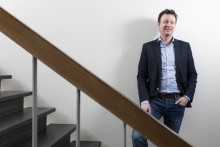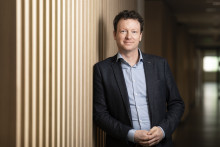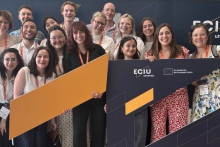ECIU University
The ECIU University is a European university involving twelve ECIU (European Consortium of Innovative Universities) partners, including the University of Twente which coordinates the project. The joint university offers a new type of education focused on challenge-based learning and flexible learning pathways based on the learners' choices and needs. ECIU University replaces the traditional ‘degree’ with a European competence passport. Multidisciplinary teams of learners (students and professionals) work together on solving real-life challenges proposed by industry, cities and communities.
The initial pilot project was launched in November 2019 and lasted three years. More than 400 students and 100 teachers and staff members have been involved in the project so far. ECIU University now received new funding of €14.4 million from the EU Erasmus+ programme, therefore entering a new phase in its development as of November 2022.
ECIU University has received a big grant from the European Union Erasmus programme. Does this mean that it is no longer a pilot, but a ‘real’ university?
Sander Lotze: ‘Yes, we have indeed completed the pilot stage and now we are entering the start-up phase. The pilot was about testing out everything – challenge-based learning, flexible learning pathways, micro-credentials and so on. We have learnt a lot and we have shown that in order to make serious progress, we need serious support from the European Union – which we have now received. We have proven that a new European university is not a dream, but a real possibility.’
How large is this grant and how will it be used?
‘The grant from the Erasmus+ programme is formally €14.4 million for the period of four years. However, the total spending for the whole project is €18 million, as the universities need to provide additional funding. It seems like a lot of money – which it is -, but it is still not enough to cover all the costs. Just look at the sheer amount of universities involved. We have twelve universities involved in a project covering four years. The €18 million is dedicated to education, but building the whole concept of ECIU University takes more than that. We also need to invest in research and innovation. That shows the funding is nowhere near the real costs and that universities will need to invest more themselves.’
What are the main lessons you’ve learnt during the pilot and what are the next steps?
‘Our core will remain the same. We will stay focused on challenge-based learning, by which we mean solving challenges coming straight from the society and involved stakeholders. The grant will allow us to spend more time and energy on students and teachers. We now have the budget for supporting the professionalization of teachers and more budget for student mobility. Content-wise, we have focused on the Sustainable Development Goal (SDG) number 11 - sustainable cities and communities. We will now start adding more SDGs and broaden our scope. The third main change will be our digital experience platform, where all our participants can connect. We want to focus on community building, because a European university is an abstract idea. It needs to connect to everyday needs of the participants. We will pay more attention to this aspect, also at the UT.’
Speaking of the University of Twente, what can UT students and employees expect from ECIU University?
‘When it comes to student participation, ECIU University started out as an extracurricular programme, but it has proven to be too hard for students to do this on the side, as an extra activity next to their studies. We have therefore decided to include it into curricula at the UT, so that students can choose it as an elective course, probably as a minor. We aim to build it into the existing system, so that people can be involved more easily. Flexible learning pathways, which students can design themselves around the SDGs, are still at the core of the concept, but in the short run we want to attach them to existing programmes. We also want more physical recognition of ECIU University on campus. We’d like it to get its own space and become more visible.’
The Erasmus+ programme funding is granted for four years. What should ECIU University look like in 2026?
‘I hope that by 2026 the concept of flexible learning pathways is established as an alternative to traditional study programmes. Now we have to move from the pilot phase to the start-up phase. We want to grow from 500 learners to 5000 learners. That seems like a huge increase in numbers, but it is still just a fraction of students within the ECIU framework. The group of staff members directly supporting ECIU University will also increase, which means that the community is growing. We are serious about this idea, and so we need to get to volumes that are serious.’
ECIU University at the UT
As the main coordinator, the University of Twente is a big driving force behind the ECIU University. To what degree has the UT community been involved in the new European university? ‘It’s difficult to differentiate between the contributions to the UT and ECIU University,’ says Rianne Kaptijn, ECIU University local ambassador at the UT. ‘What was developed for ECIU University was also developed for the UT. Together we have pioneered challenge-based learning, micro-credentials and flexible learning pathways.’
‘With students participating in so many activities, varying from challenges during the CuriuousU summer course into participating in full 3 ECTS micro-modules, we are still in the process of gathering how many UT students and employees have been involved so far,’ adds Felix van Urk, a member of Programme Management Team that coordinates the UT's activities related to the ECIU University. ‘At the UT, we have been involved in several pilot activities. By estimate, I’d say there have been 250 – 500 students involved. We have a small group of about 15-20 UT researchers who participate in pilot research activities such as ECIU citizen science projects and seed projects to form ECIU networks, but of course we hope to grow these numbers in the next phase. During the pilot of ECIU University, we have purposely focused on creating the infrastructure and setting up procedures to optimally support this growing involvement. My main advice to everyone at the UT would be: use your own ideas and make use of this infrastructure!’







